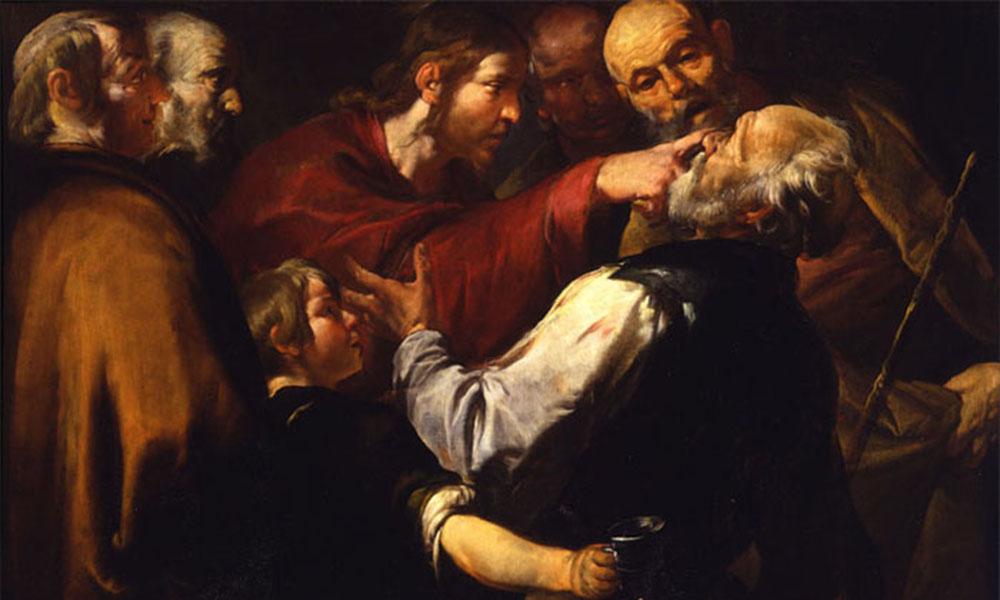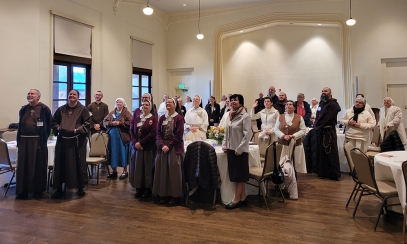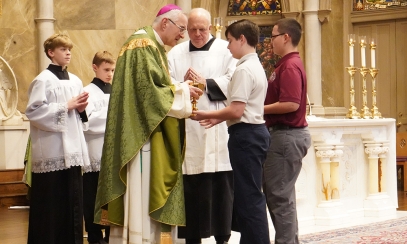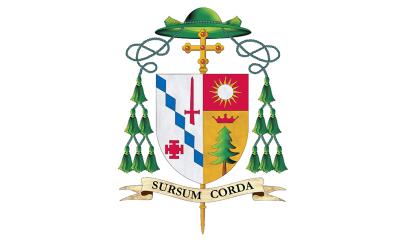
Rejoice and Become a New and Refreshing Witness of Hope, Light, and Life
Bishop Raica Celebrates the Fourth Sunday of Lent
Bishop Raica Celebrates the Fourth Sunday of Lent
On March 27, Bishop Raica celebrated Mass at the Cathedral of St. Paul, marking the fourth Sunday of Lent. The complete text of his homily follows herein.
On March 27, Bishop Raica celebrated Mass at the Cathedral of St. Paul, marking the fourth Sunday of Lent. The complete text of his homily follows herein.
My friends, today, the fourth Sunday of Lent, is also known as Laetare Sunday (or “Rejoice” Sunday). It’s a reminder that we are beyond the mid-way point of our Lenten journey. Now we are in the home stretch, headed toward its victorious conclusion. So, we rejoice because our journey is taking us to an end we have yet to imagine for ourselves, but we have already had a glimpse of it. Of course, from our vantage point, we already know the ending that awaits us. It should be a constant reminder to inform our lives every day as a true guide for knowing ourselves and our ultimate life meaning.
In our Gospel today, we meet up with a man who doesn’t come with great credentials (i.e., someone without academic degrees in theology). He is certainly not a widely charismatic figure in the society. Rather, the issue is we have a “man born blind.” The culture of the day – the way they looked at reality – suggested a certain bias and prejudice that this man must have been born blind because of something his parents or ancestors did during their lives years ago. It was a physical manifestation of punishment for their sins transmitted to future generations. Jesus says, “No! You’ve got it all wrong.” The real issue is that through the circumstances of life, the “works of God might be made visible.” As long as Christ is present, and is here now, He is “the light of the world” and, consequently, we can see. It is not helpful to get bogged down in the technicalities of “how” it happens that we do see! To a certain extent, we can trace our visual awakening to an event – the encounter we had with Jesus similar to the blind man.
Even when the blind man gave vibrant testimony about what happened, others remained incredulous – incredulous because of their conclusions were based on their prejudices. For them, they could not “see” (i.e., they were blind to the deeds God was doing right before their eyes). They began to find ways to reduce the experience – “He did it on the Sabbath!” so He cannot be a “man of God” and the miracle could not have occurred. They even doubted that the blind man was even blind! What does the blind man do? He amazingly sticks to “facts.” “I was blind.” “I washed my eyes as that man – Jesus – told me to do,” and “now I see!” Even his parents defer to their son and don’t get embroiled in the unfolding drama. The blind man continues to give witness to what he met. It is not something he could renounce. The facts remain. The truth remains, not opinions or feelings. The blind man “saw” and confessed his belief in Christ as the Son of God, a deeper sight that leaves even the sighted blind.
Our challenge as Christians, from the very first moment when we became aware of the world around us, is to open our eyes and see the world, see life, see relationships in a new way. One doesn’t need advanced degrees to do so. One only needs to follow the experience we’ve met. One thing is true: the more the disciples followed, the more their desire grew. The more Christ became a factor, a decisive factor in their lives every day. The more, then, they desired to follow right up to their own martyrdoms at times.
As Christians, we worry about who we are, or we hide who we are, wanting to “blend in.” Or we think that somehow we are confined or blocked in by the tangle of webs and inconsistencies of our lives. We feel ourselves reduced to the least, the minimum of our lives by resisting any attempt to challenge ourselves – to change our heart – or seek the challenge that will make our Christian life more dynamic, more authentic.
Oftentimes, we find the fuller expression of our lives out of reach because of failings that continue to haunt and plague us, concluding, as many do, “I’m only human!” So, our question today is this: Is our humanity, our human life defined or boxed in by our sins and failings – our lowest points? Are we defined merely by the physical or psychological debilities we have? Am I defined by the limitations of my age – too young, too old, too tired? Or my strength? Have we cheapened ourselves to think of ourselves only defined by what plagues us and weighs us down? This is what some think and why they are or may be resistant to provocation of Christ in life. That is what so many want us to believe: Living as a Christian? A true believer? “It can’t be done.” “It’s impossible.” So, I give up!
Rather, “to be human” means to be generous, to be good, to be just. It is a positive and optimistic attitude even when everything else seems so hopeless! It is Christ – a real Christ - who brings us out of the darkness that keeps us confined to our solitude and loneliness and alienation into friendship, family, and faith to a life where we can experience the true freedom of seeing and hearing and loving like never before! It is the fullness of who we are created to be: In the image of God. It is Christ who is our light, leading us to a greater experience of life – not satisfied with the status quo or our complaints of inadequacy. That’s why for Christians, life, which we seek to promote and protect at every stage, is so very important. Each person is an adventure and on a journey. Yes, it is a lifelong process, one that begins anew at each moment and continues. These are things that are not taught in classrooms – they are the lessons of life that take a lifetime to achieve.
Today, at another Mass here at the Cathedral of St. Paul, our Catechumens participated in the second scrutiny that highlighted leaving darkness behind and coming into the light – from a blindness to seeing and experiencing the ever deeper vision of faith in Christ as Lord and Savior.
As Christians, we similarly conform ourselves more and more to Christ our Light. With Christ, we learn to live the fullness of the dream that God had when He created “man and woman in His own image and likeness” and “who knew us even before we were born.” On this Rejoice Sunday, and through these remaining weeks of penance and prayer and works of charity, may we find the blessings of God to recognize that with Christ we can see and experience the fullness of life, becoming new and refreshing witnesses of hope, light, and life in a world that wants to cling to the darkness and chaos. So, our Rejoice – Laetare Sunday – is that our Lent is nearing an end and will transform us more into the very image of Christ, whose name we bear when we will have our thirst slaked, our sight restored, and a new life given to us to become a light and life for the world! May God bless you!



